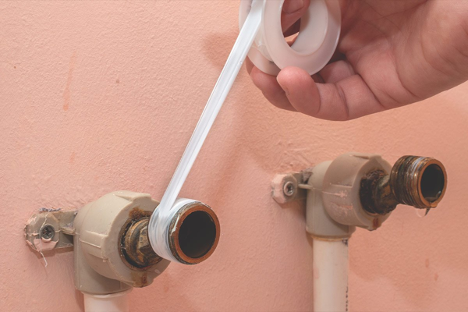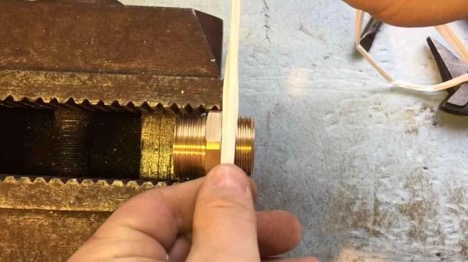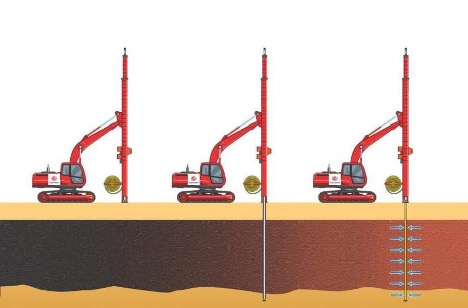How much FUM tape should be wound onto the thread: length and quantity
FUM tape, widely known as a material for sealing threaded connections, plays a key role in ensuring reliability and tightness. But a question that often arises among users is: how much fum tape should be wound on the thread? The answer to this question depends on several factors, including thread diameter and operating conditions. It is important to consider that too much tape can lead to deterioration in the quality of the connection, while not enough can lead to leaks.
The general rule is to wrap the threads with tape at least 2-3 times, but no more than 8-10 times. This quantity provides an optimal balance between tightness and ease of installation.

The content of the article
Fum tape: how many turns to wind for different types of connections
Determining how many turns to wind the fum tape depends on the type and size of the threaded connection. For small threads, 2-3 turns are usually sufficient, while for large threads 5-6 turns may be required. It is important to note that some types of connections, such as high pressure systems, may require additional turns to ensure a tight seal.
The following recommendations can be used as a guide:
- for threads up to 1/2 inch: 2-3 turns;
- for threads from 1/2 to 1 inch: 3-5 turns;
- for threads larger than 1 inch: 5-6 turns.
Which way to wind the fum tape onto the thread: winding technique
The technique of winding FUM tape is also important. In which direction should the fum tape be wound onto the thread? The correct answer is against the direction of screwing in the thread. This means that when screwing the element into the right side, the FUM tape should be wound to the left. This approach helps prevent the tape from moving during installation and ensures even distribution of the material along the threads.
When winding, it is important to ensure that the tape lies flat, without distortions or folds, which ensures the best sealing.

Fum tape or thread: choice for carving and comparison
When choosing between FUM tape and a special sealing thread, it is important to consider their features and scope of application. Fum tape or thread: the choice for threading is determined by the following factors:
- For plastic connections it is preferable to use FUM tape, while for metal ones it is preferable to use thread.
- Under high pressure and temperature conditions, the filament can provide a more secure connection.
- FUM tape is usually easier to use and does not require special skills.
Both materials have their advantages, but FUM tape is more often used due to its versatility and affordability.
Errors when applying fum tape
Proper use of fum tape can save you money and time. Errors when applying fum tape to threads can lead to loss of tightness and, ultimately, loss of resources.
The required amount of fum tape depends on the diameter of the thread and the specific requirements of the task. It is important to know that saving on fum tape can lead to leaks in the connection. Determine the thread diameter and consult the tape manufacturer or your equipment manual to determine the correct quantity.
The length of the wound fum tape also depends on the thread diameter. Sufficient rotation must be provided to ensure a good seal. However, avoid excessively long fum tape, which may interfere with installation.
Application errors:
- the fum tape must be wound evenly and without distortion; distortion can lead to uneven compaction and leaks;
- the fum tape must be wound with tension so that it fits tightly to the thread and ensures tightness;
- do not pull the fum tape too hard, as this may cause it to break or damage the thread;
- Use only fresh and unused fum tape, as old fum tape may lose its sealing properties.
Properly wrapping fum tape onto threads is important to ensure the tightness and safety of your home connections. By following the recommendations for quantity and length, and avoiding these mistakes, you can achieve reliable results when using fum tape.
Alternative uses of fum tape
Fum tape, although intended for sealing threaded connections, can have several alternative and non-standard applications. Here are some unique ways to use fum tape:
- Fum tape can be used to insulate wires in electrical connections. It provides reliable insulation and protection against moisture and corrosion.
- Fum tape can temporarily seal small leaks, such as water from a pipe or air from a hose. It can be wrapped around the damaged area to prevent temporary problems.
- Fum tape can also be used for temporary fixation of objects, for example, for attaching metal objects to a wall or other surfaces.
- Wrapped around tool handles, fum tape can improve grip and comfort while working.
- When shipping fragile items, fum tape can be used to strengthen the packaging and protect against damage.
- Fum tape can be wrapped around the handle of the tool to improve its comfort and grip.
- When wrapped around the legs of chairs or tables, fum tape can prevent slipping and protect the floor from scratches.
Alternative uses of fum tape present unique capabilities that may prove valuable in different scenarios. However, it is worth remembering that fum tape is primarily designed to seal threaded joints and its use in other contexts may limit its effectiveness.
In conclusion, the correct choice of quantity and method of winding fum tape plays a key role in ensuring the reliability and durability of threaded connections. This ensures not only tightness, but also increases operating comfort, which makes fum tape the preferred choice for many users.





